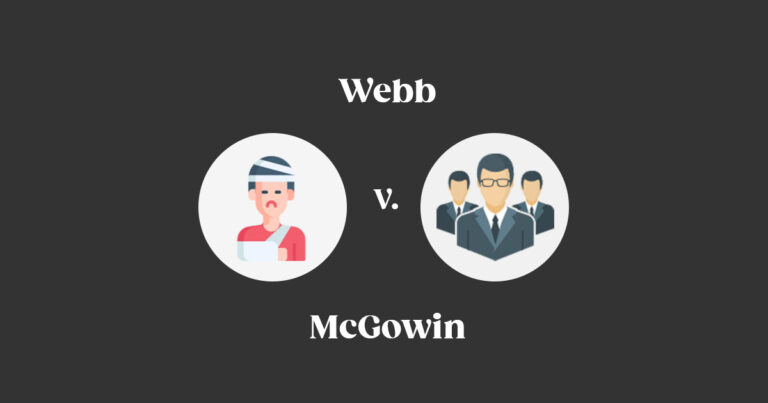Quick Summary
Joe Webb (the plaintiff) saved Greeley McGowin’s life from a falling 75-pound block, and, in recognition of his heroic action, McGowin promised to pay him $15 every two weeks for the rest of his life. However, after McGowin’s death, payments stopped, and Webb brought suit against McGowin’s estate.
The court held that the contract between Webb and McGowin was enforceable as Webb’s injury was sufficient legal consideration for McGowin’s agreement to pay. The Supreme Court denied the petition for certiorari as it was affirmed that McGowin’s promise to pay someone for saving his life was legally binding. It recognized that one’s body and life are quite valuable property, and thus saving it was sufficient consideration for McGowin’s promise.
Rule of Law
A promisor may be liable to pay for services rendered, even without a request, if they have received a material benefit from the promisee. Such benefit is sufficient consideration to support an executory promise to pay.
Facts of the Case
Joe Webb (the plaintiff) was employed at a lumber mill where he was engaged in clearing the upper floor. While performing his duties, he noticed (the defendant) Greeley McGowin, on the ground below and knew that if he dropped a 75-pound block, it could cause serious bodily harm or death to the defendant. To prevent this from happening, Webb chose to fall along with the block to divert its direction, thus saving McGowin’s life but resulting in serious bodily injuries for himself. In recognition of Webb’s heroic action, McGowin promised to pay him $15 every two weeks for the rest of his life.
McGowin kept his promise until his death eight years later. After his death, however, payments stopped, and Webb brought suit against McGowin’s estate (the defendant). The trial court entered a judgment of nonsuit against Webb.
Upon appeal to the Alabama Court of Appeals. The court of appeals reversed the decision of the trial court and held that the contract between Webb and McGowin was enforceable because Webb’s injury was sufficient legal consideration for McGowin’s agreement to pay.
The executors of McGowin’s estate then filed a petition for certiorari to the Court of Appeals to review and revise the judgment and decision.
Issue
Whether McGowin’s promise is legally binding, and should the Supreme Court grant the petition for certiorari to McGowin’s estate?
Holding and Conclusion
Yes, the promise is legally binding.
The Supreme Court denied the petition for certiorari as it was found that McGowin’s promise to pay someone for saving his life was legally binding. The court of appeals recognized a distinction between a moral obligation and one where material benefit occurred. It was concluded that McGowin received a material benefit, thus making the promise valid.
Reasoning and Analysis
The court made an exception to the general rule that past consideration could not be a consideration. This exception was made for McGowin’s promise to pay someone for saving his life, which was a type of moral obligation.
The court recognized that one’s body and life are quite valuable property, and thus saving it was sufficient consideration for McGowin’s promise. The moral obligation did not fit into the requirement of bargained-for exchange, but the court still deemed it valid as McGowin had received a material benefit from it. Therefore, the Supreme Court denied the petition for certiorari as it was affirmed that McGowin’s promise was legally binding.
Relevant FAQs of this case
What is a material benefit and how does it relate to consideration in contract law?
A material benefit is something of value received by one party from the other, and it can serve as consideration in a contract. In this case, the material benefit was McGowin’s life being saved by Webb, which was deemed sufficient consideration for McGowin’s promise to pay.
- Example: If someone hires a painter to paint their house and also provides the painter with free meals during the job, the meals could be considered a material benefit and can serve as consideration in the contract.
What is the difference between a moral obligation and a contractual obligation?
A moral obligation is an obligation to do something based on a sense of duty, honor, or conscience, while a contractual obligation is an obligation that arises from a valid agreement between parties. In this case, McGowin had a moral obligation to compensate Webb for saving his life, but this obligation was transformed into a contractual obligation due to the material benefit that McGowin received.
- Example: If a person volunteers to help their neighbor with yard work out of a sense of obligation to the community, that is a moral obligation. However, if the neighbor promises to pay the person for their help, it becomes a contractual obligation.
Why did the court make an exception for McGowin's promise to pay without a bargained-for exchange?
The court recognized that while there was no direct exchange of consideration between McGowin and Webb, McGowin did receive a material benefit – the saving of his life – which was deemed sufficient consideration to support his promise to pay. Additionally, the court acknowledged that one’s body and life are valuable property, and therefore, the promise to compensate someone for saving one’s life is valid.
- Example: If someone promises to pay their friend for driving them to the hospital during a medical emergency, even though the friend did not request compensation, it could be considered a valid promise due to the material benefit received by the person being transported.
Was this case brief helpful?
